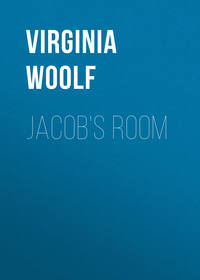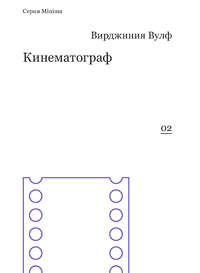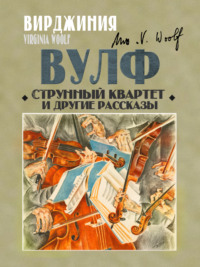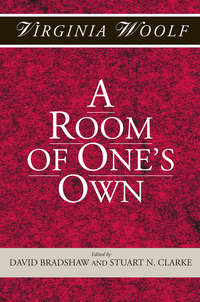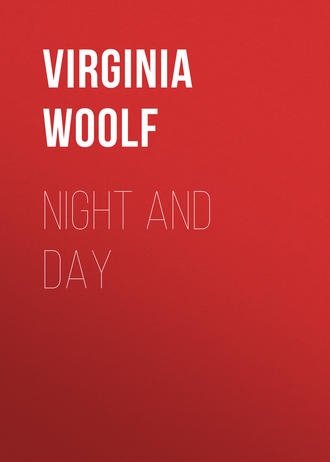 полная версия
полная версияNight and Day
“At any rate, they haven’t made a convert of Katharine, which was what I was afraid of,” Mr. Hilbery remarked.
“Oh no,” said Katharine very decidedly, “I wouldn’t work with them for anything.”
“It’s curious,” Mr. Hilbery continued, agreeing with his daughter, “how the sight of one’s fellow-enthusiasts always chokes one off. They show up the faults of one’s cause so much more plainly than one’s antagonists. One can be enthusiastic in one’s study, but directly one comes into touch with the people who agree with one, all the glamor goes. So I’ve always found,” and he proceeded to tell them, as he peeled his apple, how he committed himself once, in his youthful days, to make a speech at a political meeting, and went there ablaze with enthusiasm for the ideals of his own side; but while his leaders spoke, he became gradually converted to the other way of thinking, if thinking it could be called, and had to feign illness in order to avoid making a fool of himself – an experience which had sickened him of public meetings.
Katharine listened and felt as she generally did when her father, and to some extent her mother, described their feelings, that she quite understood and agreed with them, but, at the same time, saw something which they did not see, and always felt some disappointment when they fell short of her vision, as they always did. The plates succeeded each other swiftly and noiselessly in front of her, and the table was decked for dessert, and as the talk murmured on in familiar grooves, she sat there, rather like a judge, listening to her parents, who did, indeed, feel it very pleasant when they made her laugh.
Daily life in a house where there are young and old is full of curious little ceremonies and pieties, which are discharged quite punctually, though the meaning of them is obscure, and a mystery has come to brood over them which lends even a superstitious charm to their performance. Such was the nightly ceremony of the cigar and the glass of port, which were placed on the right hand and on the left hand of Mr. Hilbery, and simultaneously Mrs. Hilbery and Katharine left the room. All the years they had lived together they had never seen Mr. Hilbery smoke his cigar or drink his port, and they would have felt it unseemly if, by chance, they had surprised him as he sat there. These short, but clearly marked, periods of separation between the sexes were always used for an intimate postscript to what had been said at dinner, the sense of being women together coming out most strongly when the male sex was, as if by some religious rite, secluded from the female. Katharine knew by heart the sort of mood that possessed her as she walked upstairs to the drawing-room, her mother’s arm in hers; and she could anticipate the pleasure with which, when she had turned on the lights, they both regarded the drawing-room, fresh swept and set in order for the last section of the day, with the red parrots swinging on the chintz curtains, and the arm-chairs warming in the blaze. Mrs. Hilbery stood over the fire, with one foot on the fender, and her skirts slightly raised.
“Oh, Katharine,” she exclaimed, “how you’ve made me think of Mamma and the old days in Russell Square! I can see the chandeliers, and the green silk of the piano, and Mamma sitting in her cashmere shawl by the window, singing till the little ragamuffin boys outside stopped to listen. Papa sent me in with a bunch of violets while he waited round the corner. It must have been a summer evening. That was before things were hopeless…”
As she spoke an expression of regret, which must have come frequently to cause the lines which now grew deep round the lips and eyes, settled on her face. The poet’s marriage had not been a happy one. He had left his wife, and after some years of a rather reckless existence, she had died, before her time. This disaster had led to great irregularities of education, and, indeed, Mrs. Hilbery might be said to have escaped education altogether. But she had been her father’s companion at the season when he wrote the finest of his poems. She had sat on his knee in taverns and other haunts of drunken poets, and it was for her sake, so people said, that he had cured himself of his dissipation, and become the irreproachable literary character that the world knows, whose inspiration had deserted him. As Mrs. Hilbery grew old she thought more and more of the past, and this ancient disaster seemed at times almost to prey upon her mind, as if she could not pass out of life herself without laying the ghost of her parent’s sorrow to rest.
Katharine wished to comfort her mother, but it was difficult to do this satisfactorily when the facts themselves were so much of a legend. The house in Russell Square, for example, with its noble rooms, and the magnolia-tree in the garden, and the sweet-voiced piano, and the sound of feet coming down the corridors, and other properties of size and romance – had they any existence? Yet why should Mrs. Alardyce live all alone in this gigantic mansion, and, if she did not live alone, with whom did she live? For its own sake, Katharine rather liked this tragic story, and would have been glad to hear the details of it, and to have been able to discuss them frankly. But this it became less and less possible to do, for though Mrs. Hilbery was constantly reverting to the story, it was always in this tentative and restless fashion, as though by a touch here and there she could set things straight which had been crooked these sixty years. Perhaps, indeed, she no longer knew what the truth was.
“If they’d lived now,” she concluded, “I feel it wouldn’t have happened. People aren’t so set upon tragedy as they were then. If my father had been able to go round the world, or if she’d had a rest cure, everything would have come right. But what could I do? And then they had bad friends, both of them, who made mischief. Ah, Katharine, when you marry, be quite, quite sure that you love your husband!”
The tears stood in Mrs. Hilbery’s eyes.
While comforting her, Katharine thought to herself, “Now this is what Mary Datchet and Mr. Denham don’t understand. This is the sort of position I’m always getting into. How simple it must be to live as they do!” for all the evening she had been comparing her home and her father and mother with the Suffrage office and the people there.
“But, Katharine,” Mrs. Hilbery continued, with one of her sudden changes of mood, “though, Heaven knows, I don’t want to see you married, surely if ever a man loved a woman, William loves you. And it’s a nice, rich-sounding name too – Katharine Rodney, which, unfortunately, doesn’t mean that he’s got any money, because he hasn’t.”
The alteration of her name annoyed Katharine, and she observed, rather sharply, that she didn’t want to marry any one.
“It’s very dull that you can only marry one husband, certainly,” Mrs. Hilbery reflected. “I always wish that you could marry everybody who wants to marry you. Perhaps they’ll come to that in time, but meanwhile I confess that dear William – ” But here Mr. Hilbery came in, and the more solid part of the evening began. This consisted in the reading aloud by Katharine from some prose work or other, while her mother knitted scarves intermittently on a little circular frame, and her father read the newspaper, not so attentively but that he could comment humorously now and again upon the fortunes of the hero and the heroine. The Hilberys subscribed to a library, which delivered books on Tuesdays and Fridays, and Katharine did her best to interest her parents in the works of living and highly respectable authors; but Mrs. Hilbery was perturbed by the very look of the light, gold-wreathed volumes, and would make little faces as if she tasted something bitter as the reading went on; while Mr. Hilbery would treat the moderns with a curious elaborate banter such as one might apply to the antics of a promising child. So this evening, after five pages or so of one of these masters, Mrs. Hilbery protested that it was all too clever and cheap and nasty for words.
“Please, Katharine, read us something REAL.”
Katharine had to go to the bookcase and choose a portly volume in sleek, yellow calf, which had directly a sedative effect upon both her parents. But the delivery of the evening post broke in upon the periods of Henry Fielding, and Katharine found that her letters needed all her attention.
CHAPTER VIII
She took her letters up to her room with her, having persuaded her mother to go to bed directly Mr. Hilbery left them, for so long as she sat in the same room as her mother, Mrs. Hilbery might, at any moment, ask for a sight of the post. A very hasty glance through many sheets had shown Katharine that, by some coincidence, her attention had to be directed to many different anxieties simultaneously. In the first place, Rodney had written a very full account of his state of mind, which was illustrated by a sonnet, and he demanded a reconsideration of their position, which agitated Katharine more than she liked. Then there were two letters which had to be laid side by side and compared before she could make out the truth of their story, and even when she knew the facts she could not decide what to make of them; and finally she had to reflect upon a great many pages from a cousin who found himself in financial difficulties, which forced him to the uncongenial occupation of teaching the young ladies of Bungay to play upon the violin.
But the two letters which each told the same story differently were the chief source of her perplexity. She was really rather shocked to find it definitely established that her own second cousin, Cyril Alardyce, had lived for the last four years with a woman who was not his wife, who had borne him two children, and was now about to bear him another. This state of things had been discovered by Mrs. Milvain, her aunt Celia, a zealous inquirer into such matters, whose letter was also under consideration. Cyril, she said, must be made to marry the woman at once; and Cyril, rightly or wrongly, was indignant with such interference with his affairs, and would not own that he had any cause to be ashamed of himself. Had he any cause to be ashamed of himself, Katharine wondered; and she turned to her aunt again.
“Remember,” she wrote, in her profuse, emphatic statement, “that he bears your grandfather’s name, and so will the child that is to be born. The poor boy is not so much to blame as the woman who deluded him, thinking him a gentleman, which he IS, and having money, which he has NOT.”
“What would Ralph Denham say to this?” thought Katharine, beginning to pace up and down her bedroom. She twitched aside the curtains, so that, on turning, she was faced by darkness, and looking out, could just distinguish the branches of a plane-tree and the yellow lights of some one else’s windows.
“What would Mary Datchet and Ralph Denham say?” she reflected, pausing by the window, which, as the night was warm, she raised, in order to feel the air upon her face, and to lose herself in the nothingness of night. But with the air the distant humming sound of far-off crowded thoroughfares was admitted to the room. The incessant and tumultuous hum of the distant traffic seemed, as she stood there, to represent the thick texture of her life, for her life was so hemmed in with the progress of other lives that the sound of its own advance was inaudible. People like Ralph and Mary, she thought, had it all their own way, and an empty space before them, and, as she envied them, she cast her mind out to imagine an empty land where all this petty intercourse of men and women, this life made up of the dense crossings and entanglements of men and women, had no existence whatever. Even now, alone, at night, looking out into the shapeless mass of London, she was forced to remember that there was one point and here another with which she had some connection. William Rodney, at this very moment, was seated in a minute speck of light somewhere to the east of her, and his mind was occupied, not with his book, but with her. She wished that no one in the whole world would think of her. However, there was no way of escaping from one’s fellow-beings, she concluded, and shut the window with a sigh, and returned once more to her letters.
She could not doubt but that William’s letter was the most genuine she had yet received from him. He had come to the conclusion that he could not live without her, he wrote. He believed that he knew her, and could give her happiness, and that their marriage would be unlike other marriages. Nor was the sonnet, in spite of its accomplishment, lacking in passion, and Katharine, as she read the pages through again, could see in what direction her feelings ought to flow, supposing they revealed themselves. She would come to feel a humorous sort of tenderness for him, a zealous care for his susceptibilities, and, after all, she considered, thinking of her father and mother, what is love?
Naturally, with her face, position, and background, she had experience of young men who wished to marry her, and made protestations of love, but, perhaps because she did not return the feeling, it remained something of a pageant to her. Not having experience of it herself, her mind had unconsciously occupied itself for some years in dressing up an image of love, and the marriage that was the outcome of love, and the man who inspired love, which naturally dwarfed any examples that came her way. Easily, and without correction by reason, her imagination made pictures, superb backgrounds casting a rich though phantom light upon the facts in the foreground. Splendid as the waters that drop with resounding thunder from high ledges of rock, and plunge downwards into the blue depths of night, was the presence of love she dreamt, drawing into it every drop of the force of life, and dashing them all asunder in the superb catastrophe in which everything was surrendered, and nothing might be reclaimed. The man, too, was some magnanimous hero, riding a great horse by the shore of the sea. They rode through forests together, they galloped by the rim of the sea. But waking, she was able to contemplate a perfectly loveless marriage, as the thing one did actually in real life, for possibly the people who dream thus are those who do the most prosaic things.
At this moment she was much inclined to sit on into the night, spinning her light fabric of thoughts until she tired of their futility, and went to her mathematics; but, as she knew very well, it was necessary that she should see her father before he went to bed. The case of Cyril Alardyce must be discussed, her mother’s illusions and the rights of the family attended to. Being vague herself as to what all this amounted to, she had to take counsel with her father. She took her letters in her hand and went downstairs. It was past eleven, and the clocks had come into their reign, the grandfather’s clock in the hall ticking in competition with the small clock on the landing. Mr. Hilbery’s study ran out behind the rest of the house, on the ground floor, and was a very silent, subterranean place, the sun in daytime casting a mere abstract of light through a skylight upon his books and the large table, with its spread of white papers, now illumined by a green reading-lamp. Here Mr. Hilbery sat editing his review, or placing together documents by means of which it could be proved that Shelley had written “of” instead of “and,” or that the inn in which Byron had slept was called the “Nag’s Head” and not the “Turkish Knight,” or that the Christian name of Keats’s uncle had been John rather than Richard, for he knew more minute details about these poets than any man in England, probably, and was preparing an edition of Shelley which scrupulously observed the poet’s system of punctuation. He saw the humor of these researches, but that did not prevent him from carrying them out with the utmost scrupulosity.
He was lying back comfortably in a deep arm-chair smoking a cigar, and ruminating the fruitful question as to whether Coleridge had wished to marry Dorothy Wordsworth, and what, if he had done so, would have been the consequences to him in particular, and to literature in general. When Katharine came in he reflected that he knew what she had come for, and he made a pencil note before he spoke to her. Having done this, he saw that she was reading, and he watched her for a moment without saying anything. She was reading “Isabella and the Pot of Basil,” and her mind was full of the Italian hills and the blue daylight, and the hedges set with little rosettes of red and white roses. Feeling that her father waited for her, she sighed and said, shutting her book:
“I’ve had a letter from Aunt Celia about Cyril, father… It seems to be true – about his marriage. What are we to do?”
“Cyril seems to have been behaving in a very foolish manner,” said Mr. Hilbery, in his pleasant and deliberate tones.
Katharine found some difficulty in carrying on the conversation, while her father balanced his finger-tips so judiciously, and seemed to reserve so many of his thoughts for himself.
“He’s about done for himself, I should say,” he continued. Without saying anything, he took Katharine’s letters out of her hand, adjusted his eyeglasses, and read them through.
At length he said “Humph!” and gave the letters back to her.
“Mother knows nothing about it,” Katharine remarked. “Will you tell her?”
“I shall tell your mother. But I shall tell her that there is nothing whatever for us to do.”
“But the marriage?” Katharine asked, with some diffidence.
Mr. Hilbery said nothing, and stared into the fire.
“What in the name of conscience did he do it for?” he speculated at last, rather to himself than to her.
Katharine had begun to read her aunt’s letter over again, and she now quoted a sentence. “Ibsen and Butler… He has sent me a letter full of quotations – nonsense, though clever nonsense.”
“Well, if the younger generation want to carry on its life on those lines, it’s none of our affair,” he remarked.
“But isn’t it our affair, perhaps, to make them get married?” Katharine asked rather wearily.
“Why the dickens should they apply to me?” her father demanded with sudden irritation.
“Only as the head of the family – ”
“But I’m not the head of the family. Alfred’s the head of the family. Let them apply to Alfred,” said Mr. Hilbery, relapsing again into his arm-chair. Katharine was aware that she had touched a sensitive spot, however, in mentioning the family.
“I think, perhaps, the best thing would be for me to go and see them,” she observed.
“I won’t have you going anywhere near them,” Mr. Hilbery replied with unwonted decision and authority. “Indeed, I don’t understand why they’ve dragged you into the business at all – I don’t see that it’s got anything to do with you.”
“I’ve always been friends with Cyril,” Katharine observed.
“But did he ever tell you anything about this?” Mr. Hilbery asked rather sharply.
Katharine shook her head. She was, indeed, a good deal hurt that Cyril had not confided in her – did he think, as Ralph Denham or Mary Datchet might think, that she was, for some reason, unsympathetic – hostile even?
“As to your mother,” said Mr. Hilbery, after a pause, in which he seemed to be considering the color of the flames, “you had better tell her the facts. She’d better know the facts before every one begins to talk about it, though why Aunt Celia thinks it necessary to come, I’m sure I don’t know. And the less talk there is the better.”
Granting the assumption that gentlemen of sixty who are highly cultivated, and have had much experience of life, probably think of many things which they do not say, Katharine could not help feeling rather puzzled by her father’s attitude, as she went back to her room. What a distance he was from it all! How superficially he smoothed these events into a semblance of decency which harmonized with his own view of life! He never wondered what Cyril had felt, nor did the hidden aspects of the case tempt him to examine into them. He merely seemed to realize, rather languidly, that Cyril had behaved in a way which was foolish, because other people did not behave in that way. He seemed to be looking through a telescope at little figures hundreds of miles in the distance.
Her selfish anxiety not to have to tell Mrs. Hilbery what had happened made her follow her father into the hall after breakfast the next morning in order to question him.
“Have you told mother?” she asked. Her manner to her father was almost stern, and she seemed to hold endless depths of reflection in the dark of her eyes.
Mr. Hilbery sighed.
“My dear child, it went out of my head.” He smoothed his silk hat energetically, and at once affected an air of hurry. “I’ll send a note round from the office… I’m late this morning, and I’ve any amount of proofs to get through.”
“That wouldn’t do at all,” Katharine said decidedly. “She must be told – you or I must tell her. We ought to have told her at first.”
Mr. Hilbery had now placed his hat on his head, and his hand was on the door-knob. An expression which Katharine knew well from her childhood, when he asked her to shield him in some neglect of duty, came into his eyes; malice, humor, and irresponsibility were blended in it. He nodded his head to and fro significantly, opened the door with an adroit movement, and stepped out with a lightness unexpected at his age. He waved his hand once to his daughter, and was gone. Left alone, Katharine could not help laughing to find herself cheated as usual in domestic bargainings with her father, and left to do the disagreeable work which belonged, by rights, to him.
CHAPTER IX
Katharine disliked telling her mother about Cyril’s misbehavior quite as much as her father did, and for much the same reasons. They both shrank, nervously, as people fear the report of a gun on the stage, from all that would have to be said on this occasion. Katharine, moreover, was unable to decide what she thought of Cyril’s misbehavior. As usual, she saw something which her father and mother did not see, and the effect of that something was to suspend Cyril’s behavior in her mind without any qualification at all. They would think whether it was good or bad; to her it was merely a thing that had happened.
When Katharine reached the study, Mrs. Hilbery had already dipped her pen in the ink.
“Katharine,” she said, lifting it in the air, “I’ve just made out such a queer, strange thing about your grandfather. I’m three years and six months older than he was when he died. I couldn’t very well have been his mother, but I might have been his elder sister, and that seems to me such a pleasant fancy. I’m going to start quite fresh this morning, and get a lot done.”
She began her sentence, at any rate, and Katharine sat down at her own table, untied the bundle of old letters upon which she was working, smoothed them out absent-mindedly, and began to decipher the faded script. In a minute she looked across at her mother, to judge her mood. Peace and happiness had relaxed every muscle in her face; her lips were parted very slightly, and her breath came in smooth, controlled inspirations like those of a child who is surrounding itself with a building of bricks, and increasing in ecstasy as each brick is placed in position. So Mrs. Hilbery was raising round her the skies and trees of the past with every stroke of her pen, and recalling the voices of the dead. Quiet as the room was, and undisturbed by the sounds of the present moment, Katharine could fancy that here was a deep pool of past time, and that she and her mother were bathed in the light of sixty years ago. What could the present give, she wondered, to compare with the rich crowd of gifts bestowed by the past? Here was a Thursday morning in process of manufacture; each second was minted fresh by the clock upon the mantelpiece. She strained her ears and could just hear, far off, the hoot of a motor-car and the rush of wheels coming nearer and dying away again, and the voices of men crying old iron and vegetables in one of the poorer streets at the back of the house. Rooms, of course, accumulate their suggestions, and any room in which one has been used to carry on any particular occupation gives off memories of moods, of ideas, of postures that have been seen in it; so that to attempt any different kind of work there is almost impossible.
Katharine was unconsciously affected, each time she entered her mother’s room, by all these influences, which had had their birth years ago, when she was a child, and had something sweet and solemn about them, and connected themselves with early memories of the cavernous glooms and sonorous echoes of the Abbey where her grandfather lay buried. All the books and pictures, even the chairs and tables, had belonged to him, or had reference to him; even the china dogs on the mantelpiece and the little shepherdesses with their sheep had been bought by him for a penny a piece from a man who used to stand with a tray of toys in Kensington High Street, as Katharine had often heard her mother tell. Often she had sat in this room, with her mind fixed so firmly on those vanished figures that she could almost see the muscles round their eyes and lips, and had given to each his own voice, with its tricks of accent, and his coat and his cravat. Often she had seemed to herself to be moving among them, an invisible ghost among the living, better acquainted with them than with her own friends, because she knew their secrets and possessed a divine foreknowledge of their destiny. They had been so unhappy, such muddlers, so wrong-headed, it seemed to her. She could have told them what to do, and what not to do. It was a melancholy fact that they would pay no heed to her, and were bound to come to grief in their own antiquated way. Their behavior was often grotesquely irrational; their conventions monstrously absurd; and yet, as she brooded upon them, she felt so closely attached to them that it was useless to try to pass judgment upon them. She very nearly lost consciousness that she was a separate being, with a future of her own. On a morning of slight depression, such as this, she would try to find some sort of clue to the muddle which their old letters presented; some reason which seemed to make it worth while to them; some aim which they kept steadily in view – but she was interrupted.


